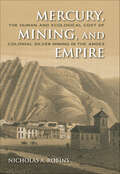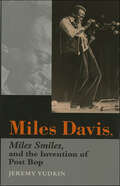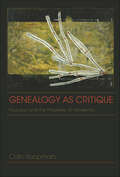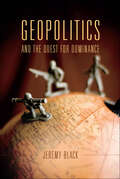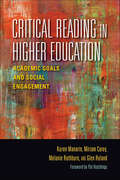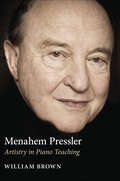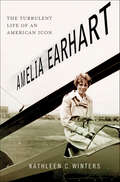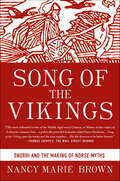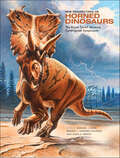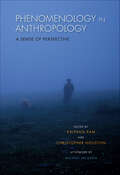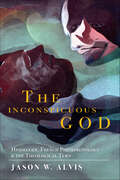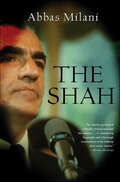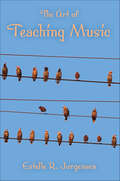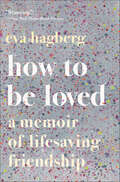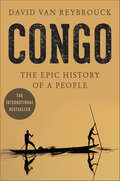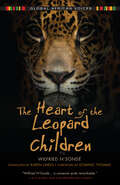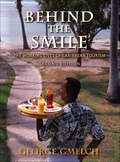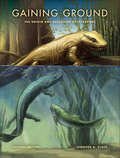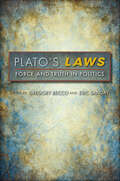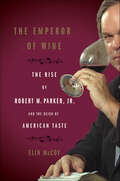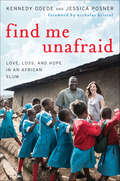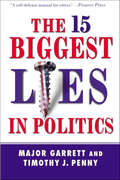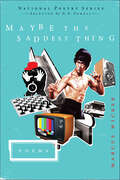- Table View
- List View
Mercury, Mining, and Empire: The Human and Ecological Cost of Colonial Silver Mining in the Andes
by Nicholas A. RobinsOn the basis of an examination of the colonial mercury and silver production processes and related labor systems, Mercury, Mining, and Empire explores the effects of mercury pollution in colonial Huancavelica, Peru, and Potosí, in present-day Bolivia. The book presents a multifaceted and interwoven tale of what colonial exploitation of indigenous peoples and resources left in its wake. It is a socio-ecological history that explores the toxic interrelationships between mercury and silver production, urban environments, and the people who lived and worked in them. Nicholas A. Robins tells the story of how native peoples in the region were conscripted into the noxious ranks of foot soldiers of proto-globalism, and how their fate, and that of their communities, was—and still is—chained to it.
Miles Davis, Miles Smiles, and the Invention of Post Bop
by Jeremy YudkinFocusing on one of the legendary musicians in jazz, this book examines Miles Davis's often overlooked music of the mid-1960s with a close examination of the evolution of a new style: post bop. Jeremy Yudkin traces Davis's life and work during a period when the trumpeter was struggling with personal and musical challenges only to emerge once again as the artistic leader of his generation.A major force in post-war American jazz, Miles Davis was a pioneer of cool jazz, hard bop, and modal jazz in a variety of small group formats. The formation in the mid-1960s of the Second Quintet with Wayne Shorter, Herbie Hancock, Ron Carter, and Tony Williams was vital to the invention of the new post bop style. Yudkin illustrates and precisely defines this style with an analysis of the 1966 classic Miles Smiles.
PornBurger: Hot Buns and Juicy Beefcakes
by Mathew RamseyIndulge your naughtiest food fantasies and satisfy your gluttony and lust with this succulent cook-and-look book, from a self-described “burger pervert” and creator of the notorious PornBurger blog.PornBurger is Washington, DC, chef, food stylist, and creative producer Mathew Ramsey’s orgasmic experiment: ingredient-driven, flavor-intense, sensually divine excess that caters to the food fetishist in all of us. Shamelessly health-unconscious and ready to entertain (or offend), Ramsey’s recipes deliver the ultimate in debauched burger stackography—handcrafted buns, patties, toppings, and sides, even some boozy beverages—expertly designed and lusciously photographed in a set of bombshell burger pinups.But don’t be fooled by raunchy descriptions and Ramsey’s signature burger puns, like the Bill U Murray Me?, Spamela Anderson, and the Willem DaFoe–nut. This burger freak is a culinary-school-educated chef devoted to the dark arts of hamburgery. Ramsey shows you how to master as many essential cooking techniques as he offers graphically delicious images to ogle. Whet your appetite with delectable concoctions like the Horn Dog: clover honey, whole kernel corn jalapeño batter, slow-roasted pork belly, pickled hot dog, two smash-cooked PornBurger beef patties; the James Francophile: quick pickled beets, truffled demi-glace, Gruyère de Comté, one PornBurger beef patty, bone marrow onion jam, potato-chip-crusted fois gras gougère; and I Woke Up Like This: sriracha mustard, arugula, smoked bacon, American cheese, fried chicken thigh, quick-pickled hamburger dills, White Castle cheeseburger waffle.Combining tantalizing meat blends, grinds, and cooking methods, a tempting range of vegetarian and pescatarian delights, and lip-smacking custom ketchups and pickles, PornBurger offers the ultimate dining experience and entices you to create your own culi-naughty adventure. Every element of every burger is open to reinterpretation—with PornBurger, get weird, get wild, and leave no burger fantasy unimagined . . . or uneaten.
Genealogy as Critique: Foucault and the Problems of Modernity (American Philosophy)
by Colin KoopmanViewing Foucault in the light of work by Continental and American philosophers, most notably Nietzsche, Habermas, Deleuze, Richard Rorty, Bernard Williams, and Ian Hacking, Genealogy as Critique shows that philosophical genealogy involves not only the critique of modernity but also its transformation. Colin Koopman engages genealogy as a philosophical tradition and a method for understanding the complex histories of our present social and cultural conditions. He explains how our understanding of Foucault can benefit from productive dialogue with philosophical allies to push Foucaultian genealogy a step further and elaborate a means of addressing our most intractable contemporary problems.
Geopolitics and the Quest for Dominance
by Jeremy BlackHistory and geography delineate the operation of power, not only its range but also the capacity to plan and the ability to implement. Approaching state strategy and policy from the spatial angle, Jeremy Black argues that just as the perception of power is central to issues of power, so place, and its constraints and relationships, is partly a matter of perception, not merely map coordinates. Geopolitics, he maintains, is as much about ideas and perception as it is about the actual spatial dimensions of power. Black's study ranges widely, examining geography and the spatial nature of state power from the 15th century to the present day. He considers the rise of British power, geopolitics and the age of Imperialism, the Nazis and World War II, and the Cold War, and he looks at the key theorists of the latter 20th century, including Henry Kissinger, Francis Fukuyama and Samuel P. Huntington, Philip Bobbitt, Niall Ferguson, and others.
Critical Reading in Higher Education: Academic Goals and Social Engagement (Scholarship of Teaching and Learning)
by Glen Ryland Melanie Rathburn Karen Manarin Miriam CareyFaculty often worry that students can't or won't read critically, a foundational skill for success in academic and professional endeavors. "Critical reading" refers both to reading for academic purposes and reading for social engagement. This volume is based on collaborative, multidisciplinary research into how students read in first-year courses in subjects ranging from scientific literacy through composition. The authors discovered the good (students can read), the bad (students are not reading for social engagement), and the ugly (class assignments may be setting students up for failure) and they offer strategies that can better engage students and provide more meaningful reading experiences.
Menahem Pressler: Artistry in Piano Teaching
by William BrownAs soloist, master class teacher, and pianist of the world-renowned Beaux Arts Trio, Menahem Pressler can boast of four Grammy nominations, three honorary doctorates, more than 80 recordings, and lifetime achievement awards presented by France, Germany, and Israel. Former Pressler student William Brown traces the master's pianistic development through Rudiakov, Kestenberg, Vengerova, Casadesus, Petri, and Steuermann, blending techniques and traditions derived from Beethoven, Chopin, Liszt, and J. S. Bach. Brown presents Pressler's approach to performance and teaching, including technical exercises, principles of relaxation and total body involvement, and images to guide the pianist's creativity toward expressive interpretation. Insights from the author's own lessons, interviews with Pressler, and recollections of more than 100 Pressler students from the past 50 years are gathered in this text. Measure-by-measure lessons on 23 piano masterworks by, among others, Bach, Bartók, Debussy, and Ravel as well as transcriptions of Pressler's fingerings, hand redistributions, practicing guidelines, musical scores, and master class performances are included.
Amelia Earhart: The Turbulent Life of an American Icon
by Kathleen C. WintersWhen Amelia Earhart disappeared over the Pacific in 1937, she was at the height of her fame. Fascination with Earhart remains just as strong today, as her mysterious disappearance continues to inspire speculation. In this nuanced and often surprising biography, acclaimed aviation historian Kathleen C. Winters moves beyond the caricature of the spunky, precocious pilot to offer a more complex portrait. Drawing on a wealth of contemporary accounts, airline records, and other original research, this book reveals a flawed heroine who was frequently reckless and lacked basic navigation skills, but who was also a canny manipulator of mass media. Winters details how Earhart and her husband, publisher George Putnam, worked to establish her as an international icon, even as other spectacular pilots went unnoticed. Sympathetic yet unsentimental, this biography helps us to see Amelia Earhart with fresh eyes.
Song of the Vikings: Snorri and the Making of Norse Myths
by Nancy Marie BrownMuch like Greek and Roman mythology, Norse myths are still with us. Famous storytellers from JRR Tolkien to Neil Gaiman have drawn their inspiration from the long-haired, mead-drinking, marauding and pillaging Vikings. Their creator is a thirteenth-century Icelandic chieftain by the name of Snorri Sturluson. Like Homer, Snorri was a bard, writing down and embellishing the folklore and pagan legends of medieval Scandinavia. Unlike Homer, Snorri was a man of the world—a wily political power player, one of the richest men in Iceland who came close to ruling it, and even closer to betraying it… In Song of the Vikings, award-winning author Nancy Marie Brown brings Snorri Sturluson's story to life in a richly textured narrative that draws on newly available sources.
New Perspectives on Horned Dinosaurs: The Royal Tyrrell Museum Ceratopsian Symposium (Life of the Past)
by Michael J. Ryan, Brenda J. Chinnery-Allgeier and David A. EberthEasily distinguished by the horns and frills on their skulls, ceratopsians were one of the most successful of all dinosaurs. This volume presents a broad range of cutting-edge research on the functional biology, behavior, systematics, paleoecology, and paleogeography of the horned dinosaurs, and includes descriptions of newly identified species.
Phenomenology in Anthropology: A Sense of Perspective
by Michael JacksonThis volume explores what phenomenology adds to the enterprise of anthropology, drawing on and contributing to a burgeoning field of social science research inspired by the phenomenological tradition in philosophy. Essays by leading scholars ground their discussions of theory and method in richly detailed ethnographic case studies. The contributors broaden the application of phenomenology in anthropology beyond the areas in which it has been most influential—studies of sensory perception, emotion, bodiliness, and intersubjectivity—into new areas of inquiry such as martial arts, sports, dance, music, and political discourse.
The Inconspicuous God: Heidegger, French Phenomenology & the Theological Turn (Indiana Series in the Philosophy of Religion)
by Jason W. AlvisDominique Janicaud once famously critiqued the work of French phenomenologists of the theological turn because their work was built on the seemingly corrupt basis of Heidegger's notion of the inapparent or inconspicuous. In this powerful reconsideration and extension of Heidegger's phenomenology of the inconspicuous, Jason W. Alvis deftly suggests that inconspicuousness characterizes something fully present and active, yet quickly overlooked. Alvis develops the idea of inconspicuousness through creative appraisals of key concepts of the thinkers of the French theological turn and then employs it to describe the paradoxes of religious experience.
The Shah
by Abbas MilaniThe definitive biography of the last Shah of Iran, tracing his dramatic rise and fall and his role in the creation of the contemporary Islamic Republic. Though his monarchy was toppled in 1979 and he died in 1980, the life of Mohammad-Reza Shah Pahlevi, the last Shah of Iran, continues to resonate today. Here, internationally respected author Abbas Milani gives us the definitive biography, more than ten years in the making, of the monarch who shaped Iran's modern age and with it the contemporary politics of the Middle East.The Shah's was a life filled with contradiction—as a social reformer he built schools, increased equality for women, and greatly reduced the power of the Shia clergy. He made Iran a global power, courting Western leaders from Churchill to Carter, and nationalized his country's many natural resources. But he was deeply conflicted and insecure in his powerful role. Intolerant of political dissent, he was eventually overthrown by the very people whose loyalty he so desperately sought. This comprehensive and gripping account shows us how Iran went from politically moderate monarchy to totalitarian Islamic republic. Milani reveals the complex and sweeping road that would bring the U.S. and Iran to where they are today.
The Art of Teaching Music (Counterpoints: Music and Education)
by Estelle R. JorgensenThe Art of Teaching Music takes up important aspects of the art of music teaching ranging from organization to serving as conductor to dealing with the disconnect between the ideal of university teaching and the reality in the classroom. Writing for both established teachers and instructors on the rise, Estelle R. Jorgensen opens a conversation about the life and work of the music teacher. The author regards music teaching as interrelated with the rest of lived life, and her themes encompass pedagogical skills as well as matters of character, disposition, value, personality, and musicality. She reflects on musicianship and practical aspects of teaching while drawing on a broad base of theory, research, and personal experience. Although grounded in the practical realities of music teaching, Jorgensen urges music teachers to think and act artfully, imaginatively, hopefully, and courageously toward creating a better world.
How to Be Loved: A Memoir of Lifesaving Friendship
by Eva HagbergA luminous memoir about how friendship saved one woman&’s life, for anyone who has loved a friend who was sick, grieving, or lost—and for anyone who has struggled to seek or accept help Eva Hagberg spent her lonely youth looking everywhere for connection: drugs, alcohol, therapists, boyfriends, girlfriends. Sometimes she found it, but always temporarily. Then, at age thirty, an undiscovered mass in her brain ruptured. So did her life. A brain surgery marked only the beginning of a long journey, and when her illness hit a critical stage, it forced her to finally admit the long-suppressed truth: she was vulnerable, she needed help, and she longed to grow. She needed true friendship for the first time. How to Be Loved is the story of how an isolated person&’s life was ripped apart only to be gently stitched back together through friendship, and the recovery—of many stripes—that came along the way. It explores the isolation so many of us feel despite living in an age of constant connectivity; how our ambitions sometimes pull us apart more than bring us together; and how a simple doughnut, delivered by a caring soul, can become the essence of what makes a life valuable. With gorgeous prose shot through with empathy, pain, fear, and the secret truths inside all of us, Eva writes about the friends who taught her to grow up and open her heart—and how the relentlessness of suffering can give rise to the greatest joy.
Congo: The Epic History of a People
by David Van ReybrouckHailed as "a monumental history . . . more exciting than any novel" (NRC Handelsblad),David van Reybrouck’s rich and gripping epic, in the tradition of Robert Hughes' The Fatal Shore, tells the extraordinary story of one of the world's most devastated countries: the Democratic Republic of Congo. Epic in scope yet eminently readable, penetrating and deeply moving, David van Reybrouck's Congo: The Epic History of a People traces the fate of one of the world's most critical, failed nation-states, second only to war-torn Somalia: the Democratic Republic of Congo.Van Reybrouck takes us through several hundred years of history, bringing some of the most dramatic episodes in Congolese history. Here are the people and events that have impinged the Congo's development—from the slave trade to the ivory and rubber booms; from the arrival of Henry Morton Stanley to the tragic regime of King Leopold II; from global indignation to Belgian colonialism; from the struggle for independence to Mobutu's brutal rule; and from the world famous Rumble in the Jungle to the civil war over natural resources that began in 1996 and still rages today.Van Reybrouck interweaves his own family's history with the voices of a diverse range of individuals—charismatic dictators, feuding warlords, child-soldiers, the elderly, female merchant smugglers, and many in the African diaspora of Europe and China—to offer a deeply humane approach to political history, focusing squarely on the Congolese perspective and returning a nation's history to its people.
The Heart of the Leopard Children (Global African Voices)
by Wilfried N'SondéA nameless young man lives in the housing projects outside of Paris. When he was a child, his parents moved with him from the Congo to France, hoping in vain to escape poverty and violence. His best friend, Drissa, is in a psychiatric hospital and now Mireille, his girlfriend, the woman with whom he has shared his childhood and hopes, has left him to reconnect with her Jewish roots in Israel. During a night out to drown the pain of his heartache, there is a fight with a policeman, the policeman dies, and the young man is arrested and taken to jail. Between police beatings and abrupt interrogations, his memory becomes his sole ally to escape from the exiguous space in which he is confined. Half-conscious and delirious, he reflects on his journey from the land of his ancestors to his life in the projects with Drissa and Mireille. In The Heart of the Leopard Children, N'Sondé explores the themes of love and pain, belonging and uprooting, desire and fear—all with an implacable and irresistible accuracy. Wilfried N'Sondé's first novel awakens the reader with an urban symphony of desire and lost love, attuned to the violence that accompanies the struggle for social ascension and a sense of belonging, and the paralyzing sentiment of betrayal that inhabits a young man caught between traditions and cultures. Awarded the Prix des Cinq Continents de la Francophonie and the Prix Senghor for the originality of his work, the author captures the sounds, rhythms and pleas of a young man who pulls on the alarm from his prison cell to warn against the multiple barriers of confinement that risk the future of certain sectors of French youth today.
Behind the Smile: The Working Lives of Caribbean Tourism
by George GmelchBehind the Smile is an inside look at the world of Caribbean tourism as seen through the lives of the men and women in the tourist industry in Barbados. The workers represent every level of tourism, from maid to hotel manager, beach gigolo to taxi driver, red cap to diving instructor. These highly personal accounts offer insight into complex questions surrounding tourism: how race shapes interactions between tourists and workers, how tourists may become agents of cultural change, the meaning of sexual encounters between locals and tourists, and the real economic and ecological costs of development through tourism. This updated edition updates the text and includes several new narratives and a new chapter about American students' experiences during summer field school and home stays in Barbados.
Gaining Ground: The Origin and Evolution of Tetrapods (Life of the Past)
by Jennifer A. ClackAround 370 million years ago, a distant relative of a modern lungfish began a most extraordinary adventure—emerging from the water and laying claim to the land. Over the next 70 million years, this tentative beachhead had developed into a worldwide colonization by ever-increasing varieties of four-limbed creatures known as tetrapods, the ancestors of all vertebrate life on land. This new edition of Jennifer A. Clack's groundbreaking book tells the complex story of their emergence and evolution. Beginning with their closest relatives, the lobe-fin fishes such as lungfishes and coelacanths, Clack defines what a tetrapod is, describes their anatomy, and explains how they are related to other vertebrates. She looks at the Devonian environment in which they evolved, describes the known and newly discovered species, and explores the order and timing of anatomical changes that occurred during the fish-to-tetrapod transition.
Plato's Laws: Force and Truth in Politics (Studies in Continental Thought)
by Gregory Recco and Eric SandayReaders of Plato have often neglected the Laws because of its length and density. In this set of interpretive essays, notable scholars of the Laws from the fields of classics, history, philosophy, and political science offer a collective close reading of the dialogue "book by book" and reflect on the work as a whole. In their introduction, editors Gregory Recco and Eric Sanday explore the connections among the essays and the dramatic and productive exchanges between the contributors. This volume fills a major gap in studies on Plato's dialogues by addressing the cultural and historical context of the Laws and highlighting their importance to contemporary scholarship.
The Emperor of Wine: The Rise of Robert M. Parker, Jr. and the Reign of American Taste
by Elin McCoyThe first book to chronicle the rise of Robert M. Parker, Jr., the world's most influential and controversial wine critic, who, over the last twenty–five years, has dominated the international wine world and embodied the triumph of American taste.This is the story of how an American lawyer raised on Coca–Cola caused a revolution in the way wines around the globe are made, sold, and talked about.To his legions of fans, Parker is a cross between Julia Child and Ralph Nader –– part enthusiastic sensualist and part consumer crusader. To his many enemies, he is a self–appointed wine judge bent on reducing the meaning of wine to a two–digit number. The man who now rules the world of wine has been the focus of both adulation and death threats. He rose to his pinnacle of power by means of the traditional American virtues of hard work, determination, and integrity –– coupled with an unshakeable ego and a maniacal obsession with a beverage that aspires to a seductive art form: fine wine.Parker's influential bimonthly newsletter, The Wine Advocate, with more than 45,000 subscribers across the United States and in more than thirty–seven countries, exerts the single most significant influence on consumers' wine–buying habits and trends in America, Europe, and the Far East, and impacts the way wine is being made in every wine–producing country in the world, from France to Australia. Parker has been profiled in countless magazines and newspapers around the world and most of his dozen books have been best sellers in the United States and abroad. Yet, despite the world's attention and unending acclaim, Robert Parker stands at the center of a heated controversy. Is he a passionate lover of wine who, more than anyone else, is responsible for its vastly improved quality, or is he, as others claim, waging a war against centuries of tradition and in the process killing the soul of wine?The Emperor of Wine tackles the myriad questions that swirl about Parker and reveals how he became both worshipped and despised, revered as an infallible palate by some and blamed by others for remaking the world's wine industry into a single global market, causing prices to skyrocket, and single–handedly reshaping the taste of wine to his own preference.Elin McCoy met Robert Parker in 1981 when she was his first magazine editor, and she has followed his extraordinary rise ever since. In telling Parker's story, McCoy gives readers an unmatched, authoritative insider's view of the eccentric personalities, bitter feuds, controversies, passions, payoffs, and secrets of the wine world, explaining how wine reputations are made, how and why wine critics agree and disagree, and tracking the startling ways wines are judged, promoted, made, and sold today. This fascinating portrait of a modern–day cultural colossus shows how a world that once was the province of gentlemen's clubs and the pastime of stuffed shirts turned into a sensual hobby for the middle class, creating a luxury industry bent on making money on a worldwide scale –– and how one man has revolutionized the way the world thinks about wine.
Find Me Unafraid: Love, Loss, and Hope in an African Slum
by Jessica Posner Kennedy Odede"Kennedy is living proof that individuals can lead themselves, and their communities, out of poverty." -Salma Hayek Pinault, Time 100Find Me Unafraid tells the uncommon love story between two uncommon people whose collaboration sparked a successful movement to transform the lives of vulnerable girls and the urban poor. With a Foreword by Nicholas Kristof.This is the story of two young people from completely different worlds: Kennedy Odede from Kibera, the largest slum in Africa, and Jessica Posner from Denver, Colorado. Kennedy foraged for food, lived on the street, and taught himself to read with old newspapers. When an American volunteer gave him the work of Mandela, Garvey, and King, teenaged Kennedy decided he was going to change his life and his community. He bought a soccer ball and started a youth empowerment group he called Shining Hope for Communities (SHOFCO). Then in 2007, Wesleyan undergraduate Jessica Posner spent a semester abroad in Kenya working with SHOFCO. Breaking all convention, she decided to live in Kibera with Kennedy, and they fell in love.Their connection persisted, and Jessica helped Kennedy to escape political violence and fulfill his lifelong dream of an education, at Wesleyan University.The alchemy of their remarkable union has drawn the support of community members and celebrities alike—The Clintons, Mia Farrow, and Nicholas Kristof are among their fans—and their work has changed the lives of many of Kibera’s most vulnerable population: its girls. Jess and Kennedy founded Kibera’s first tuition-free school for girls, a large, bright blue building, which stands as a bastion of hope in what once felt like a hopeless place. But Jessica and Kennedy are just getting started—they have expanded their model to connect essential services like health care, clean water, and economic empowerment programs. They’ve opened an identical project in Mathare, Kenya’s second largest slum, and intend to expand their remarkably successful program for change.Ultimately this is a love story about a fight against poverty and hopelessness, the transformation made possible by a true love, and the power of young people to have a deep impact on the world.
The 15 Biggest Lies in Politics
by Major Garrett Tim J. PennyIn the world of politics, it's hard to separate the truth from the lies. In this strongly argued but nonpartisan book, Major Garrett and Timothy J. Penny draw on their combined decades of experience watching government work to illuminate the deceptions and delusions to which we as citizens are subjected every election season. Here are some of the lies: Tax Cuts Are Good Social Security Is a Sacred Government Trust Medicare Works Money Buys Elections Republicans Believe in Smaller Government Democrats Are Compassionate
Hegel's Phenomenology of Spirit (Studies in Phenomenology & Existential Philosophy)
by Martin HeideggerThe text of Martin Heidegger's 1930-1931 lecture course on Hegel's Phenomenology of Spirit contains some of Heidegger's most crucial statements about temporality, ontological difference and dialectic, and being and time in Hegel. Within the context of Heidegger's project of reinterpreting Western thought through its central figures, Heidegger takes up a fundamental concern of Being and Time, "a dismantling of the history of ontology with the problematic of temporality as a clue." He shows that temporality is centrally involved in the movement of thinking called phenomenology of spirit.
Maybe the Saddest Thing: Poems (National Poetry)
by Marcus WickerWinner of the 2011 National Poetry Series Prize as selected by D.A. Powell, Marcus Wicker's Maybe the Saddest Thing is a sterling collection of contemporary American poems by an exciting new and emerging voice.
